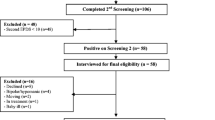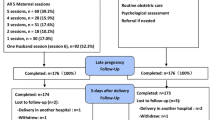Abstract
Whether and how the co-occurrence of depression and diabetes in pregnancy may worsen infant development has not been reported. Pregnant women with diabetes and with (n = 34) or without (n = 34) major depressive disorder (MDD) were followed during pregnancy and 6-months postpartum. The MDD subset received randomly assigned treatment with cognitive behavior therapy (CBT) or supportive counseling (SC). Depression severity was measured with the Beck Depression Inventory (BDI); infant developmental outcomes were measured with the Bayley Scales of Infant Development (BSID) and its Behavior Rating Scale (BRS). Infants of women with MDD had lower BRS scores (p = .02). Reduction in depression scores was associated with better infant outcomes on the BSID and BRS (p values <.03). These preliminary findings suggest depression occurring in pregnant women with diabetes is associated with poorer infant development and improvement in prepartum depression is associated with improvement in measures of infant development.


Similar content being viewed by others
References
American Diabetes Association. (2007). Standards of medical care in diabetes—2007. Diabetes Care, 30(Suppl1), 4–38.
American Psychiatric Association. (2000). Diagnostic and statistical manual of mental dsorders (4th ed.). Washington, D.C.: American Psychiatric Association.
Appleby, L., Warner, R., Whitton, A., & Faragher, B. (1997). A controlled study of fluoxetine and cognitive-behavioural counselling in the treatment of postnatal depression. British Medical Journal, 314, 932–936.
Barrat, W. (2005). About the Barratt Simplied Measurs of Social Status (BSMSS). wbarratt.indstate.edu/socialclass/.
Bayley, N. (1993). Baley Scales of Infant Development (2nd ed.). San Antonio: Psychological corporation (Harcourt Brace and Company).
Beck, A. T., Steer, R. A., & Garbin, M. G. (1988). Psychometric properties of the Beck Depression Inventory: Twenty-five years of evaluation. Clinical Psychology Review, 8, 77–100.
Crowther, C. A., Hiller, J. E., Moss, J. R., McPhee, A. J., Jeffries, W. S., & Robinson, J. S. (2005). Effect of treatment of gestational diabetes mellitus on pregnancy outcomes. New England Journal of Medicine, 352, 2477–2486.
Diego, M. A., Jones, N. A., Field, T., Hernandez-Reif, M., Schanberg, S., Kuhn, C., et al. (2006). Maternal psychological distress, prenatal cortisol, and fetal weight. Psychosomatic Medicine, 68, 747–753.
Elkin, I., Shea, M. T., Watkins, J. T., Imber, S. D., Sotsky, S. M., Collins, J. F., et al. (1989). National Institute of Health Treatment of Depression Collaborative Research Program: General effectiveness of treatments. Archives of General Psychiatry, 46, 971–982.
Fagan, J. F., & Shepherd, P. A. (1986). The Fagan test of infant intelligence. Cleveland: InfanTest Corporation.
Freinkel, N. (1980). Banting lecture. Of pregnancy and progeny. Diabetes, 29, 1023–1035.
Gloaguen, V., Cottraux, J., Cucherat, M., & Blackburn, I. M. (1998). A meta-analysis of the effects of cognitive therapy in depressed patients. Journal of Affective Disorders, 49, 59–72.
Henry, A. L., Beach, A. J., Stowe, Z. N., & Newport, D. J. (2004). The fetus and maternal depression: Implications for antenatal treatment guidelines. Clinical Obstetrics and Gynecology, 47, 535–546.
Hod, M., Levy-Shiff, R., Lerman, M., Schindel, B., Ben Rafael, Z., & Bar, J. (1999). Developmental outcome of offspring of pregestational diabetic mothers. Journal of Pediatric Endocrinology and Metabolism, 12, 867–872.
Holden, J. M., Sagovsky, R., & Cox, J. L. (1989). Counselling in a general practice setting: Controlled study of health visitor intervention in treatment of postnatal depression. British Medical Journal, 298, 223–226.
Hollingshead, A. B. (1975). Four-Factor Index of Social Status. New Haven, CT: Yale University Press.
Hollon, S. D., DeRubeis, R. J., Evans, M. D., Wiemer, M. J., Garvey, M. J., Grove, W. M., et al. (1992). Cognitive therapy and pharmacotherapy for depression: Singly and in combination. Archives of General Psychiatry, 49, 774–781.
Huot, R. L., Brennan, P. A., Stowe, Z. N., Plotsky, P. M., & Walker, E. F. (2004). Negative affect in offspring of depressed mothers is predicted by infant cortisol levels at 6 months and maternal depression during pregnancy, but not postpartum. Annals of the New York Academy of Sciences, 1032, 234–236.
Jones, N. A., Field, T., Davalos, M., & Pickens, J. (1997). EEG stability in infants/children of depressed mothers. Child Psychiatry and Human Development, 28, 59–70.
Lundy, B., Jones, N., Field, T., Nearing, G., Davalos, M., Pietro, P., et al. (1999). Prenatal depression effects on neonates. Infant Behavior and Development, 22, 119–129.
Lustman, P. J., Anderson, R. J., Freedland, K. E., de Groot, M., & Carney, R. M. (2000). Depression and poor glycemic control: A meta-analytic review of the literature. Diabetes Care, 23, 434–442.
Lustman, P. J., Griffith, L. S., Clouse, R. E., Glick, D. S., & Freedland, K. E. (1997). Efficacy of cognitive therapy for depression in NIDDM: Results of a controlled clinical trial. Diabetes, 46(suppl 1), 13A.
Lustman, P. J., Griffith, L. S., Freedland, K. E., Kissel, S. S., & Clouse, R. E. (1998). Cognitive behavior therapy for depression in type 2 diabetes: A randomized controlled trial. Annals of Internal Medicine, 129, 613–621.
Marrero, D. G., Vandagriff, J. L., Gibson, R., Fineberg, S. E., Fineberg, N. S., Hiar, C. E., et al. (1992). Immediate HbA1c results: Performance of new HbA1c system in pediatric outpatient population. Diabetes Care, 15, 1045–1049.
McCowan, L. M., Pryor, J., & Harding, J. E. (2002). Perinatal predictors of neurodevelopmental outcome in small-for-gestational-age children at 18 months of age. American Journal of Obstetrics and Gynecology, 186, 1069–1075.
McGrath, E., Wypij, D., Rappaport, L. A., Newburger, J. W., & Bellinger, D. C. (2004). Prediction of IQ and achievement at age 8 years from neurodevelopmental status at age 1 year in children with D-transposition of the great arteries. Pediatrics, 114, e572–e576.
McKnight, D. L., Nelson-Gray, R. O., & Barnhill, J. (1992). Dexamethasone Suppression Test and response to cognitive therapy and antidepressant medication. Behavior Therapy, 1, 99–111.
Murphy, G. E., Simons, A. D., Wetzel, R. D., & Lustman, P. J. (1984). Cognitive therapy and pharmacotherapy: Singly and together in the treatment of depression. Archives of General Psychiatry, 41, 33–41.
Reynolds, T. M., Smellie, W. S., & Twomey, P. J. (2006). Glycated haemoglobin (HbA1c) monitoring. BMJ, 333, 586–588.
Rice, F., Jones, I., & Thapar, A. (2007). The impact of gestational stress and prenatal growth on emotional problems in offspring: a review. Acta Psychiatrica Scandinavica, 115, 171–183.
Rizzo, T. A., Betzger, B. E., Dooley, S. L., & Cho, N. H. (1997). Early malnutrition and child neurobehavioral development: Insights from the study of diabetic mothers. Child Development, 68, 26–38.
Rizzo, T. A., Dooley, S. L., Metzger, B. E., Cho, N. H., Ogata, E. S., & Silverman, B. L. (1958). Prenatal and perinatal influences on long-term psychomotor development in offspring of diabetic mothers. American Journal of Obstetrics and Gynecology, 173, 1753–1758.
Rizzo, T. A., Metzger, B. E., Burns, W. J., & Burns, K. (1991). Correlations between antepartum maternal metabolism and child intelligence. New England Journal of Medicine, 325, 911–916.
Robins, L. N., Helzer, J. E., Croughan, J., & Ratcliff, K. S. (1981). National Institute of Mental Health Diagnostic Interview Schedule: Its history, characteristics, and validity. Archives of General Psychiatry, 38, 381–389.
Rush, A. J., Beck, A. T., Kovacs, M., & Hollon, S. (1977). Comparative efficacy of cognitive therapy and pharmacotherapy in the treatment of depressed outpatients. Cognitive Therapy and Research, 1, 17–37.
Silverman, B. L., Metzger, B. E., Cho, N. H., & Loeb, C. A. (1995). Impaired glucose tolerance in adolescent offspring of diabetic mothers: Relationship to fetal hyperinsulinism. Diabetes Care, 18, 611–617.
Silverman, B. L., Rizzo, T., Green, O. C., Cho, N., Winter, R. J., Ogata, E. S., et al. (1991). Long-term prospective evaluation of offspring of diabetic mothers. Diabetes, 40, 121–125.
Stewart, R. C. (2007). Maternal depression and infant growth: A review of recent evidence. Maternal Child Nutrition, 3, 94–107.
Weintrob, N., Karp, M., & Hod, M. (1996). Short- and long-range complications in offspring of diabetic mothers. Journal of Diabetes and its Complications, 10, 294–301.
Wickberg, B., & Hwang, C. P. (1996). Counselling of postnatal depression: A controlled study on a population based Swedish sample. Journal of Affective Disorders, 39, 209–216.
Williams, M. M., Clouse, R. E., & Lustman, P. J. (2006). Treating depression to prevent diabetes and its complications: Understanding depression as a medical risk factor. Clinical Diabetes, 24, 79–86.
Acknowledgments
Source of Financial support: NIH grants K24DK059364 and R01DK036452. The authors report no other declarations of interest.
Author information
Authors and Affiliations
Corresponding author
Rights and permissions
About this article
Cite this article
Hayden, T., Perantie, D.C., Nix, B.D. et al. Treating Prepartum Depression to Improve Infant Developmental Outcomes: A Study of Diabetes in Pregnancy. J Clin Psychol Med Settings 19, 285–292 (2012). https://doi.org/10.1007/s10880-011-9294-8
Published:
Issue Date:
DOI: https://doi.org/10.1007/s10880-011-9294-8




